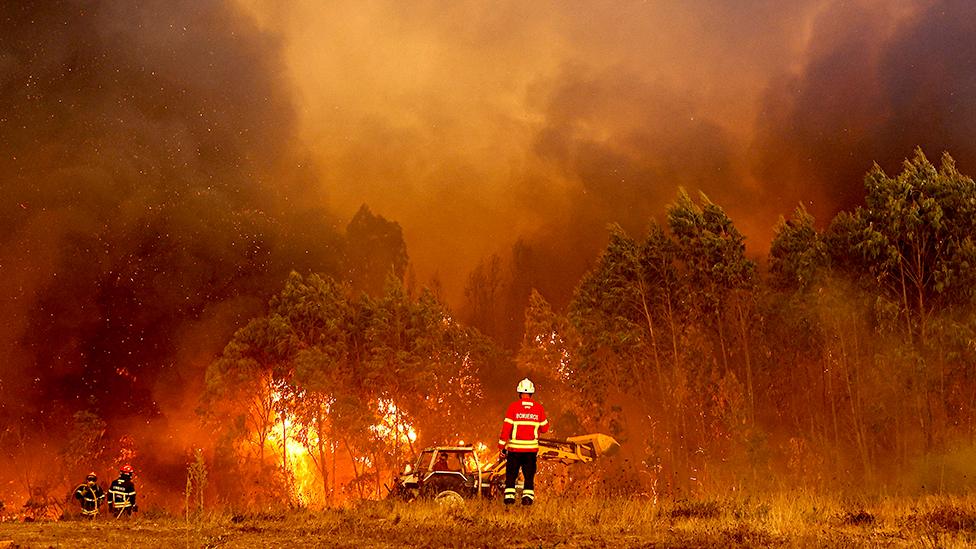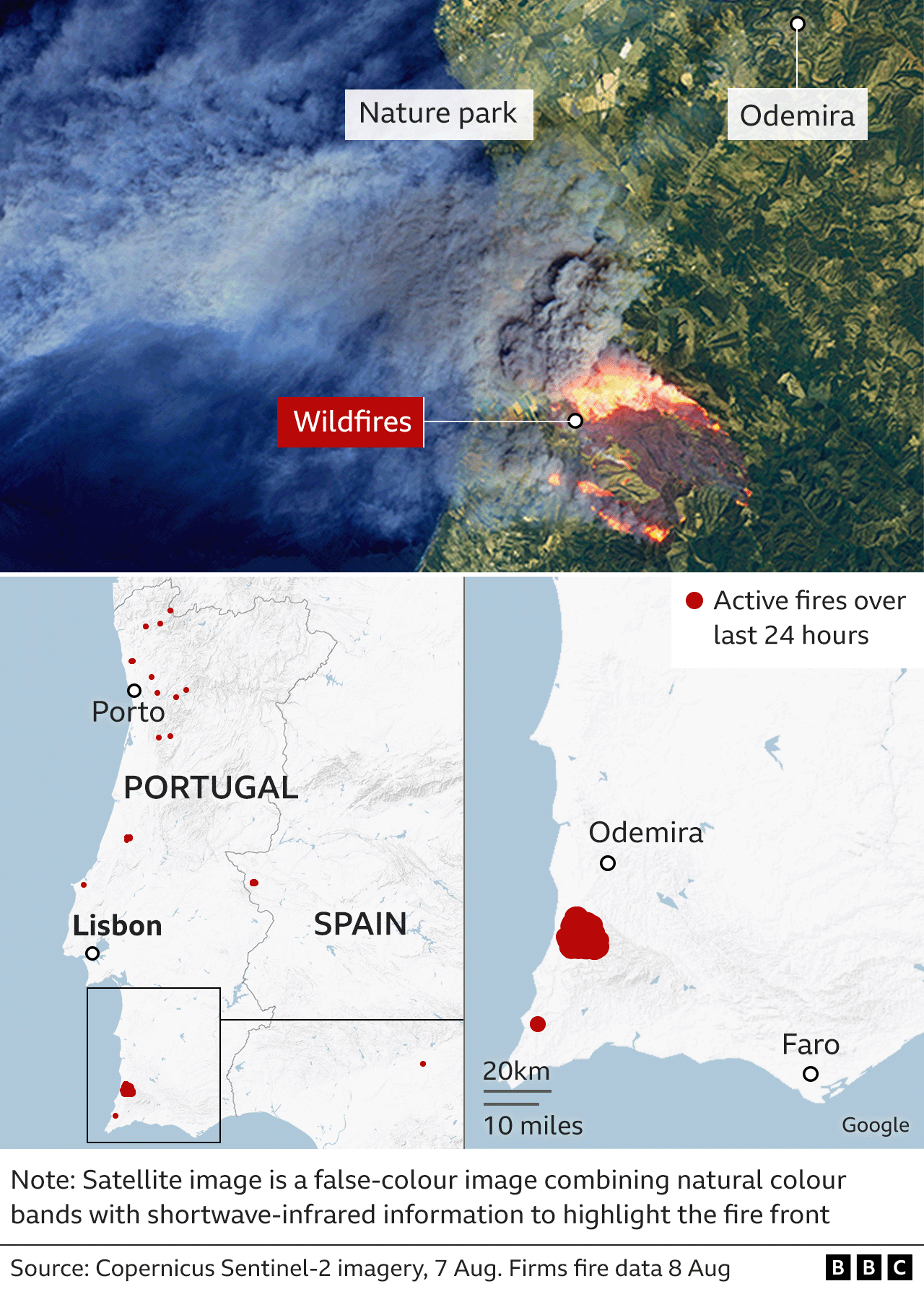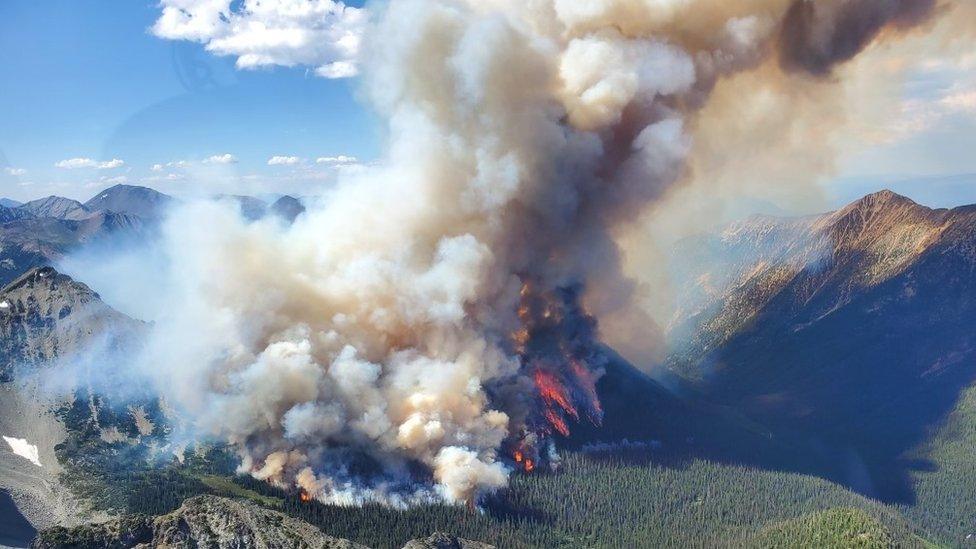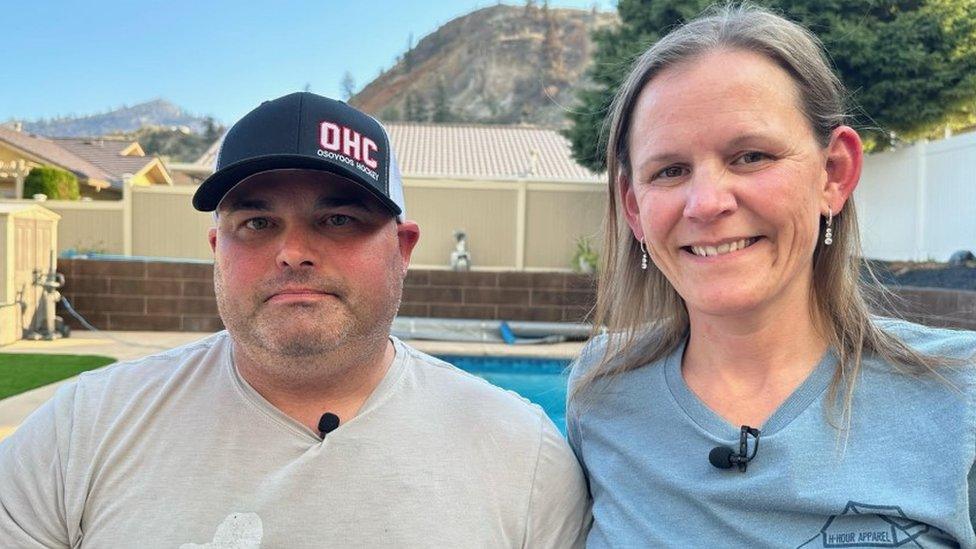Portugal battles wildfires amid third heatwave of the year
- Published

Firefighters worked to contain the flames in Odemira on Monday
Firefighters in Portugal are battling to contain wildfires engulfing thousands of hectares amid soaring temperatures.
Around 800 personnel attended a fire near the southern town of Odemira overnight on Monday, with more than 1,400 people having to evacuate.
At least nine firefighters have been injured tackling the fires.
Temperatures in excess of 40C (104F) are expected to hit much of the Iberian peninsula this week.
Three major fires that scorched hundreds of hectares in Spain over the weekend have been brought under control, but weather alerts remain in place across much of the country.
In Portugal, Monday saw a temperature of 46.4C (116F), the hottest of the year so far, recorded in Santarém.
The fire near Odemira began on Saturday and was driven south into the hilly interior of the Algarve, Portugal's main tourism region, by strong winds.
It has so far destroyed some 6,700 hectares (16,600 acres) of land, while a total of 19 villages, four tourist accommodations and a camping site have been evacuated.
The town's mayor, Helder Guerreiro, has said the situation is "critical, difficult, and complex".

Former BBC correspondent Alastair Leithead, who lives around 16km (10 miles) south of Odemira in São Teotónio, knows how dangerous and fast-moving wildfires in Portugal's countryside can be.
Last year he had just an hour's notice to load up his car with some luggage and his dogs to escape a fire which burnt part of his house.
With the flames once again raging minutes from his home, he told Radio 4's World at One programme the fires sent "everybody in this area into a real panic" on Monday but that things had calmed "a little" on Tuesday "simply because the wind has dropped."
"We had a very fast wind, a very hot and very dry wind, coming from the east... yesterday and that doubled the size of the fire in just a few hours," he said.
"A lot of people were evacuated from their homes, a few of the hotels here had to send guests elsewhere and we've had since yesterday more than 800 firefighters, as well as about 280-odd vehicles."
He said commercial eucalyptus and pine forests in the area have been engulfed, adding: "It's wild country, there aren't roads going through them, so when the fires get into the valleys they burn fast and hard, and when the wind... gets going, it's a very dangerous thing to deal with.
"The firefighters really can only direct it, try to push it to a place where there are not many trees and hope it naturally runs out of fuel."
In the centre of the country, other major fires prompted the closure of several stretches of motorway, including parts of the A1 between Lisbon and Porto.
Sixteen waterbombing aircraft have been deployed to support firefighting efforts across the two areas.
Authorities have declared more than 120 municipalities across Portugal at maximum risk of wildfires.
In Spain, fires near the south-western coastal cities of Cadiz and Huelva and in the northern Catalonia region scorched more than 1,000 hectares (2,470 acres) in total on Saturday and Sunday.
This week's heatwave will mark the third to hit the Iberian peninsula this summer.
Ruben del Campo of Spain's State Meteorological Agency told Reuters it was being caused by a large mass of hot, dry air from North Africa and would be "generally more intense, more widespread and a little longer-lasting" than the two that hit in July.
Climate change increases the risk of the hot, dry weather that is likely to fuel wildfires.
The world has already warmed by about 1.1C since the industrial era began and temperatures will keep rising unless governments around the world make steep cuts to emissions.

How have you been affected by the wildfires in Portugal? Share your experiences by emailing haveyoursay@bbc.co.uk, external.
Please include a contact number if you are willing to speak to a BBC journalist. You can also get in touch in the following ways:
WhatsApp: +44 7756 165803
Tweet: @BBC_HaveYourSay, external
Please read our terms & conditions and privacy policy
If you are reading this page and can't see the form you will need to visit the mobile version of the BBC website to submit your question or comment or you can email us at HaveYourSay@bbc.co.uk, external. Please include your name, age and location with any submission.
Related topics
- Published4 August 2023

- Published3 August 2023

